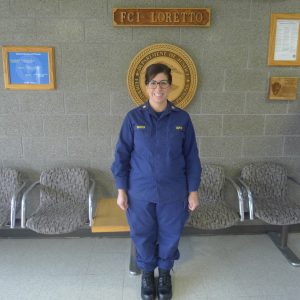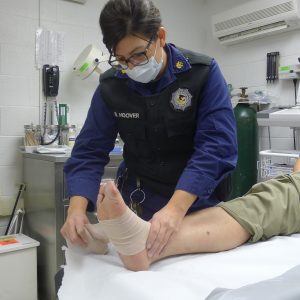Pennsylvania PA has a Passion for Correctional Medicine
PA Stephanie Hoover Ensures Inmates Have Access to Appropriate Healthcare
August 2, 2023
By LCDR Stephanie Hoover PA-C, MPAS, United States Public Health Service
As my high school graduation was rapidly approaching in 1996, I made a last-minute decision to become a PA. At that time, while there were few PA programs in my home state of Pennsylvania, opportunities for PAs to work in the healthcare system were expanding and the profession was in high demand. For me, that meant a job with a competitive salary guaranteed upon graduation, so I was hooked.
I chose to study at Saint Francis University in Loretto, Pennsylvania because it was one of the top-ranked schools in the nation at the time, but also because it’s located in my hometown. I was part of the first master’s degree class and graduated in 2001.
One of my last clinical rotations prior to graduation was in correctional medicine at Federal Correctional Institution (FCI) Loretto, a low security federal prison in West Central Pennsylvania. This was my introduction to correctional medicine and to the United States Public Health Service (USPHS).

Working in the U.S. Public Health Service
The USPHS is a division of the Department of Health and Human Services (HHS). It is a uniformed service of the government whose officers are eligible for all the same benefits as active-duty military and veterans. The service is overseen by the Surgeon General and is committed to protecting, promoting, and advancing the health of our nation. There are currently over 5,900 commissioned officers in 11 professional categories stationed in locations across the U.S. and the world.
I took my first job in the Pennsylvania State Correctional System, which allowed me to complete a loan repayment program through both the Pennsylvania Department of Health and the National Health Scholarship Corps over the course of seven years. Once these programs were completed, I was lucky enough to be able to secure a position in the Federal Bureau of Prisons (BOP) in 2008, right where I originally started my correctional experience at FCI Loretto.
Although the BOP offers many long-term benefits to its employees, I immediately knew that I wanted to join the USPHS as a Commissioned Officer and did so, commissioning in 2012. I went on to gain advanced certification as a Correctional Health Care Provider through the National Commission on Correctional Healthcare and have remained a Commissioned Officer in full-time clinical practice stationed at FCI Loretto ever since.
My typical day starts at 6 a.m. Commissioned officers are required to be uniformed the entire time we’re on duty and wear a stab vest for protection. To gain entrance to the prison, you must pass through security, like what you may see at an airport. There are x-ray machines as well as metal detectors that every person and their limited belongings need to pass through and clear before entering the facility.
I then move on and collect the daily necessities that are always secured to my body. This includes a radio for communicating with other departments in routine and emergency situations, pepper spray, and keys to unlock select secure doors I am authorized to access. All doors, cupboards, and even certain bathrooms are locked so only staff can gain entrance.
The medical care provided at this facility is like a family or urgent care practice. We have four PAs who are each assigned our own case load of patients that we are responsible for. Our clinic also includes other healthcare professionals: a Health Service Administrator, a Clinical Director, nurses, paramedics, pharmacists, dentists, dental hygienists, lab techs, and medical secretaries.
I spend each day seeing routinely scheduled patients with chronic conditions, providing preventive healthcare services, attending to urgent sick call issues, and responding to medical emergencies. We do not have an inpatient unit and anyone requiring such care would be admitted to a local hospital.
A Unique and Rewarding Career
There are many unique aspects of correctional medicine. First and foremost, as an employee of a correctional setting, you wear many hats. You are considered a correctional officer first – safety and security are your top priorities. Beyond that, I am a medical provider, helping maintain the health of the inmate population. I am also a Commissioned Officer and must uphold the standards and responsibilities of that designation.
[Wherever you want to go in your career, AAPA can help – join or renew your membership today]
Some commonly used items are less accessible at FCI Loretto compared to other healthcare settings. Office and medical supplies, which are readily available in other practice settings, may need to be secured in a locked cabinet or inventoried for accountability. This can make an otherwise quick, seamless task much more time consuming. Emergencies can also be quite interesting. People who do not work in a correctional setting may not consider the challenges and situations that take place within prison fences. The introduction of contraband, such as cell phones and illegal substances, is constantly monitored. Gang-related activity is something to be conscious of. Violence between inmates and assaults on staff are always a possibility. For these reasons, it is important that correctional workers resist complacence.

We are all taught to treat our patients with unbiased care and compassion. It is important to exercise empathy and understand that every person deserves to have access to appropriate healthcare. Working in this environment has also opened my eyes to the long-term effects of poor access to healthcare, especially among minority populations. Inmates often appreciate having access to proper, unbiased care. Like many medical providers who work in the community, the stress levels of medical staff are often fairly high. Despite this, I always try to leave work at work, exercise regularly to relieve stress, eat healthy, and enjoy my family and time at home.
Despite the stressors of this position, you are rewarded for dedicating your career to keeping inmates safe and healthy and caring for the underserved with long-term retirement benefits. Being a USPHS commissioned officer makes those benefits even greater. The opportunities to take a variety of different assignment changes or short-term deployments to respond to national emergencies and promote public health and safety make this career choice a long-term one for me. Both the USPHS and the BOP offer interested PAs a rewarding, exciting, and versatile career path.
Learn more about a career as a USPHS Commissioned Officer and the Senior Commissioned Officer Student Training and Extern Program (SRCOSTEP) in this recorded PA Like a Pro webinar.
Opinions expressed in this article are those of the author and do not necessarily represent the opinions of the Federal Bureau of Prisons or the Department of Justice.
Editor’s note: This article was originally published in March, 2022.
You May Also Like
I’m a PA in the U.S. Public Health Service
A Day in the Life of a PA in the Bureau of Prisons
After Disasters, PAs Step In To Provide Critical Medical Care
Thank you for reading AAPA’s News Central
You have 2 articles left this month. Create a free account to read more stories, or become a member for more access to exclusive benefits! Already have an account? Log in.



